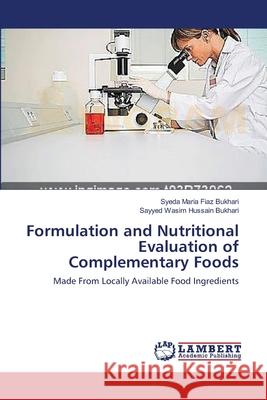Formulation and Nutritional Evaluation of Complementary Foods » książka
Formulation and Nutritional Evaluation of Complementary Foods
ISBN-13: 9783659175718 / Angielski / Miękka / 2014 / 52 str.
The current study was designed to prepare and formulate ready to use complementary food made from available local food ingredients, like rice, chick pea, groundnut, sesame, skim milk and sugar. The material was processed by using different traditional techniques like soaking, boiling, grinding. The proximate composition of three complementary foods revealed that CF1 had 4.1mg, 1.8, 0.6, 13.2, 14, 66.3 in grams/100g and 434.3 Kcal per 100 g, CF2 had 3.7, 0.8, 13, 15.9, 64.4 in g and 437.8 Kcal per 100 g and CF3 had 4.3, 1.6, 0.7, 13.7, 13.4, 66.2 in grams and 442.0 kcal per 100 g for moisture, ash, crude fiber, crude fat, crude protein, nitrogen free extract and total energy. They contained 12 to 18.4 mg iron, 6.87 to 13.9 mg zinc, 127 to183 mg calcium, 242 to 414 mg sodium, 388 to 396 mg potassium, 90 to 102 mg magnesium per 100 mg in three complementary foods. The results of sensory evaluation showed that all three complementary foods were not significantly different (p>0.05) in mean score for sensory characteristics. It was concluded that these foods are low in mineral (trace) content. If they properly fortified, they can be effective to improve nutritional status of children.
The current study was designed to prepare and formulate ready to use complementary food made from available local food ingredients, like rice, chick pea, groundnut, sesame, skim milk and sugar. The material was processed by using different traditional techniques like soaking, boiling, grinding. The proximate composition of three complementary foods revealed that CF1 had 4.1mg, 1.8, 0.6, 13.2, 14, 66.3 in grams/100g and 434.3 Kcal per 100 g, CF2 had 3.7, 0.8, 13, 15.9, 64.4 in g and 437.8 Kcal per 100 g and CF3 had 4.3, 1.6, 0.7, 13.7, 13.4, 66.2 in grams and 442.0 kcal per 100 g for moisture, ash, crude fiber, crude fat, crude protein, nitrogen free extract and total energy. They contained 12 to 18.4 mg iron, 6.87 to 13.9 mg zinc, 127 to183 mg calcium, 242 to 414 mg sodium, 388 to 396 mg potassium, 90 to 102 mg magnesium per 100 mg in three complementary foods. The results of sensory evaluation showed that all three complementary foods were not significantly different (p>0.05) in mean score for sensory characteristics. It was concluded that these foods are low in mineral (trace) content. If they properly fortified, they can be effective to improve nutritional status of children.











